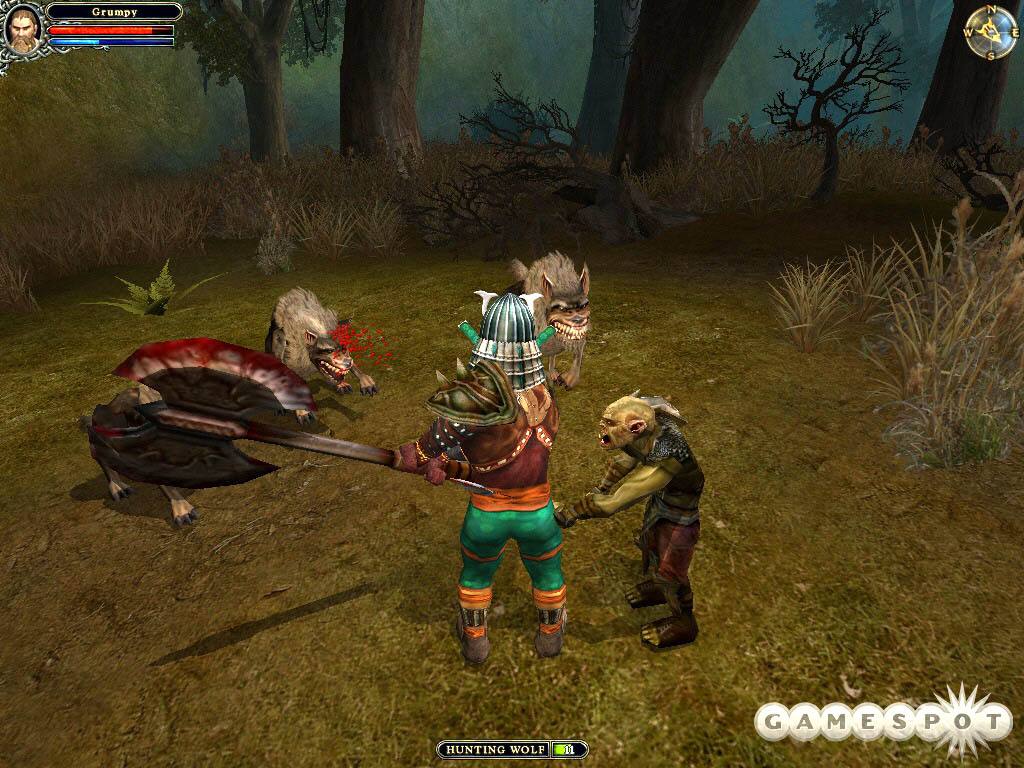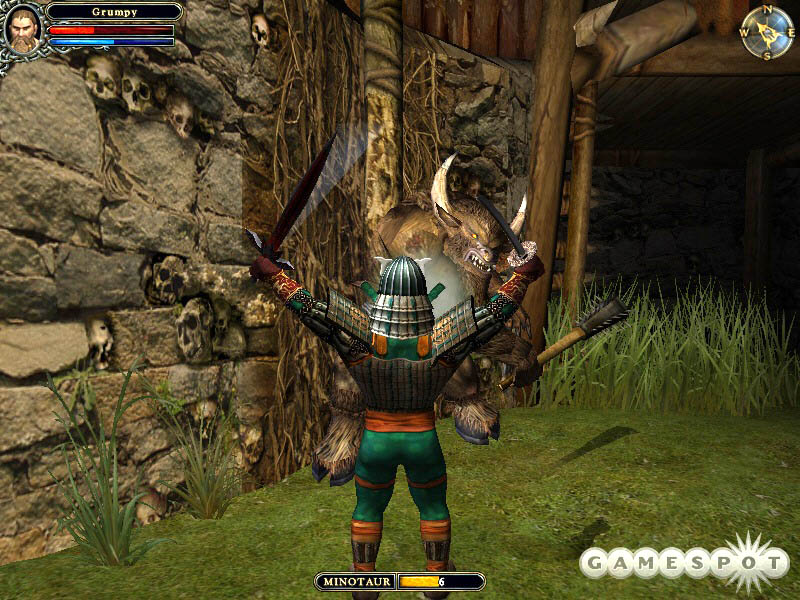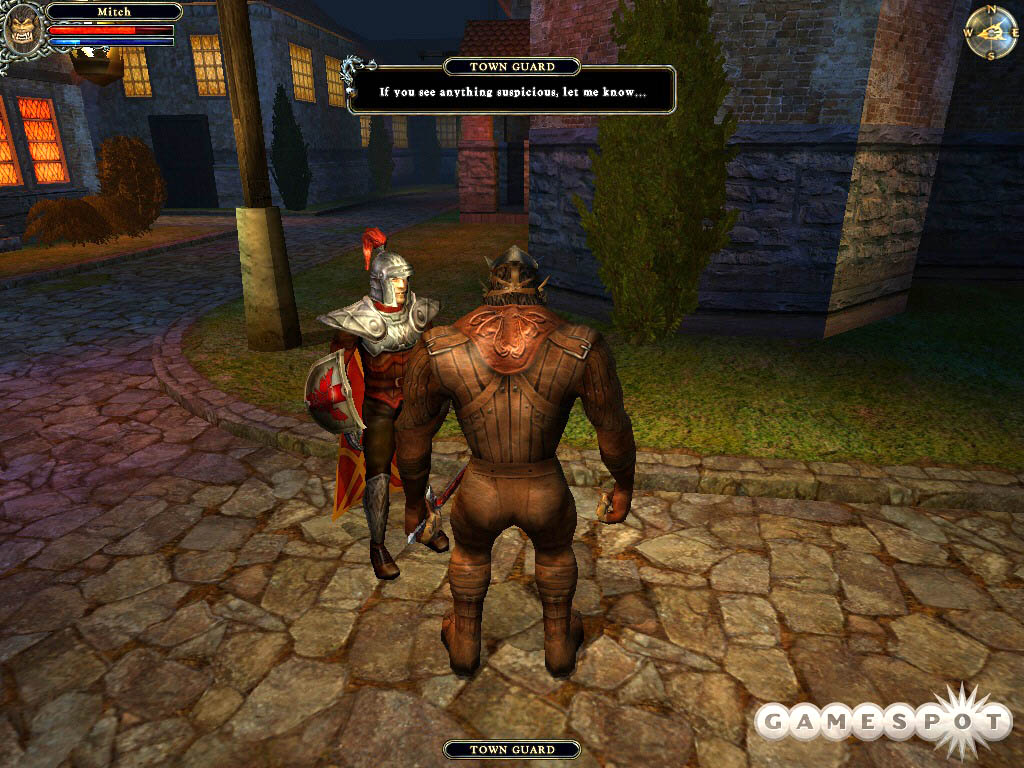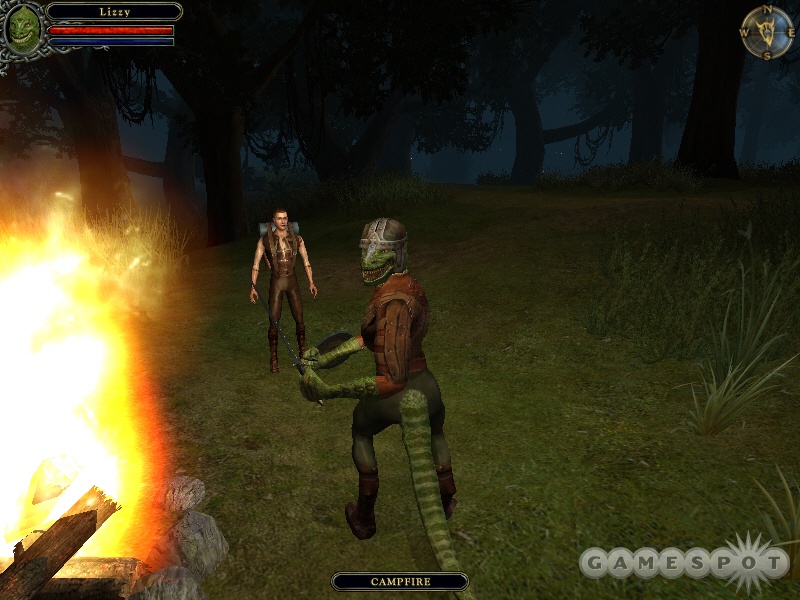Though today's role-playing games are often expected to be sweeping, story-driven epics, it used to be that most such games were pure dungeon crawls. You'd guide a band of adventurers through increasingly dangerous mazes filled with more and more, bigger and bigger monsters, while finding treasure, solving the occasional puzzle, and gaining experience levels. Dungeon Lords is a throwback to this style of gaming, with its emphasis on hack-and-slash combat and corridor crawls. As such, it's consistent with designer D.W. Bradley's previous works, which include some of the later titles in the classic Wizardry series. Dungeon Lords is a lengthy game that can offer a lot of the basic thrills that make role-playing games fun to play. Unfortunately, a slew of noticeably missing features and other problems may well end up drawing too much of your attention away from the game's good parts.

Dungeon Lords is set in a fantasy world on the verge of ruin, thanks to the ambitions of an evil wizard. This is your prototypical fantasy story, which casts you as the hero destined to save the day. Whether you see all this as typically uninspired or traditionally archetypal probably will depend on how tolerant you are of convention. At any rate, Dungeon Lords may not seem terribly original with its cast of elves, dwarves, goblins, dragons, and whatnot, but it offers a few amusing twists in its interpretations of these sorts of icons. The game's got something akin to homegrown charm. It's not flashy, and it's not trying to turn your world upside down, but it's got kind of a goofy quality about it that can be a refreshing change of pace from the very serious tone of many role-playing games. You'll notice this early on as you hear legions of goblins gleefully cackling like a bunch of bozos as they circle and swarm around you.
You play as a single character in Dungeon Lords and are free to choose from a variety of races and classes when you create him or her. The broad range of starting options turns out to be somewhat deceptive, but that's not really a bad thing. You can be everything from a dwarf fighter to an elf adept to a human mage, or maybe one of the game's several different "demigoth" races, like the diminutive thrall or the hulking urgoth. But these drastically different-sounding choices don't really limit how you can go on to develop your character as he or she continues gaining experience throughout the game. In fact, there are a whole bunch of advanced character classes that aren't available at first, which you'll be able to pursue later on as the adventure continues.
The good thing about Dungeon Lords' character advancement system is that it gives you a lot of freedom to continually fine-tune your character with incremental statistical upgrades so you can gradually develop him or her however you like. The bad thing about it is that not all the different directions in which you can grow your character seem particularly viable. Specifically, melee combat skills seem to be the best, most effective area of concentration. The magic system--featuring multiple schools of magic, each with its own spellcasting system and spells--is interesting on paper, but it isn't terribly useful in practice. At least, it's not terribly effective for the sorts of prolonged, nonstop battles you'll be experiencing throughout Dungeon Lords.

What this game does well is swarm you with enemies. Combat plays out like a basic third-person-perspective hack-and-slash game, letting you maneuver around, slashing your foes wildly. Health running low? A healing potion can whip you right back into shape. Even death doesn't matter much, as you can revive yourself at the touch of a button, at the cost of just a small penalty to your stats. This contributes to the game's breezy sort of feel, which helps make the experience fun more than stressful, at least while you're in combat. The action is simple but reasonably responsive. Side-to-side and backward movement will feel very sluggish at first, but eventually it'll seem like more of a realistic touch, since it's naturally easiest just to keep pressing forward. You'll typically face a dozen or so individual enemies at a time, and these do a good job of surrounding you and using both ranged and close attacks to try to bring you down. One aspect of the combat that's pleasantly surprising is that enemies can hit one another in their efforts to stop you. Maneuvering in such a way so that the bad guys get in one another's line of fire is one of the basic strategies involved in surviving the tougher skirmishes in Dungeon Lords.
Action in Dungeon Lords is fairly constant. Even when you're walking the streets of town or are wandering around in the wilderness (and we do mean wandering--more in a bit), it's never long before you get jumped by a throng of ne'er-do-wells and are forced to fight it out. The pretty solid, fast feel to the combat, the bright speckled spurts of blood that didn't earn this game an M rating, and the litter of gold, weapons, and other trinkets left behind in the wake of the carnage help make these random encounters generally worth looking forward to. When the dust settles, you just jam on the shift key to quickly pick up everything--a mindless process that's still rather satisfying.

So what's the problem? The problem is the game surrounding all this action isn't that good. A rudimentary quest system locks you into long-winded conversations with the occasional non-player character who might eventually tell you to go somewhere, find something, or whack somebody. And a sprawling, thinly detailed wilderness threatens to knock you off course every step of the way. Dungeon Lords isn't a short game, so you won't finish it in a weekend. But how long it ultimately takes you will greatly depend on how much time you spend getting lost.
The printed manual, and even the in-game help system, which pops up when you first begin play, assures you that you can toggle an automap with the touch of a hotkey. But you can't. At least the game ships with a printed map of the overworld (and there's an onscreen compass), which is better than nothing. Still, once you get into some of the more complicated dungeons, you'll need to memorize the layouts (or, may we suggest, map them out by hand on graph paper?) and keep your eyes peeled for tiny clues or items that may be critical to your progress.
The lack of an automap would be noticeable even if the game didn't refer to the feature, though the references make the omission much more glaring and annoying than it would have been otherwise. It's probably the most serious such omission, but unfortunately, there are plenty of others. In fact, some, but not nearly all, were addressed in a downloadable patch released about a week after the game. So, if you're waiting for the durability of your armor to decrease, give it up; it ain't gonna happen. Or if you want to customize the look of your character when you first start playing, just stop clicking on those buttons, because they're not going to work. It's strange that the references to these missing features weren't simply cut from the game, along with the features themselves.
The gaps in the design contribute to the sense that Dungeon Lords is a seriously buggy game, though for what it's worth, the game never once crashed on us on our primary test system, in this case a 2-year-old laptop. We weren't as lucky on two other, newer test systems, though. The game does perform quite well on lower-end systems, even when lots and lots of stuff is moving around and attacking onscreen. The look of it ranges from rather ugly to rather impressive. Some of the character designs look really plain and quite bad, while a lot of the enemy creatures are actually quite imaginative and fluidly animated...and are especially lively in the sorts of large groups you'll usually find them in. Meanwhile, the environments in Dungeon Lords are pretty plain. Day or night, the world of the game looks fairly drab. And you'll probably soon grow weary of how your character will often look back over his or her shoulder at you every few seconds when standing still. As for the audio, Dungeon Lords sounds about as good, and about as inconsistent, as it looks. Some nice-but-rare music and occasionally funny effects are undermined by a lot of repetition, a lot of silence, and some bad mixing that causes some sounds to play much louder or softer than others, undermining the overall impact.

Dungeon Lords includes a multiplayer feature, letting two or more adventurers play through simultaneously. We experienced some pretty bad lag with more than two players running around, but the cooperative play could help give the game some extra-added depth and longevity. It also possibly invites a greater variety of playing styles than can be justified when playing through solo, where you're forced to contend with your enemies alone (in most cases). Even so, multiplayer doesn't resolve any of Dungeon Lords' gameplay issues, so you'd need to find another fairly tolerant RPG fan to appreciate the game's finer points along with you. With some more follow-through, Dungeon Lords could have been a significantly better game, making it a lot easier to recommend to fans of the genre. As it is, the game can still be worth getting into, if you aren't particularly bothered by the parts of it that aren't there.